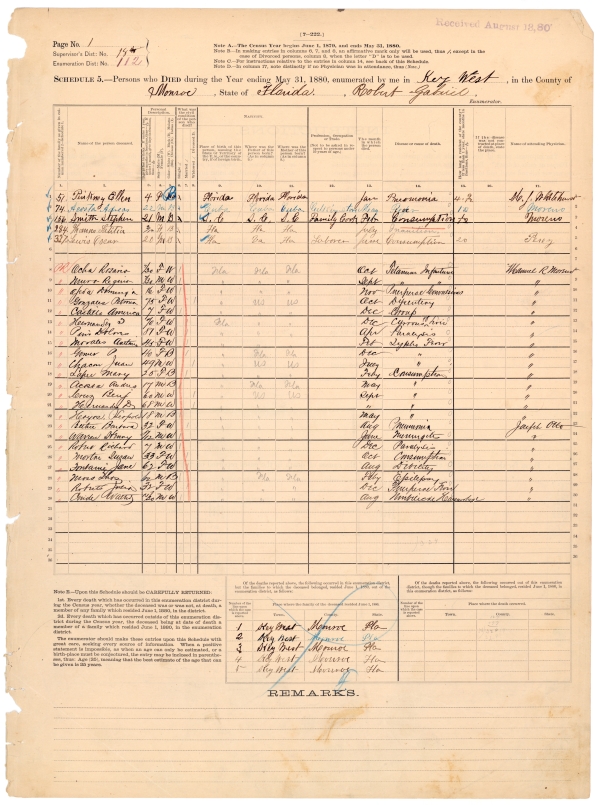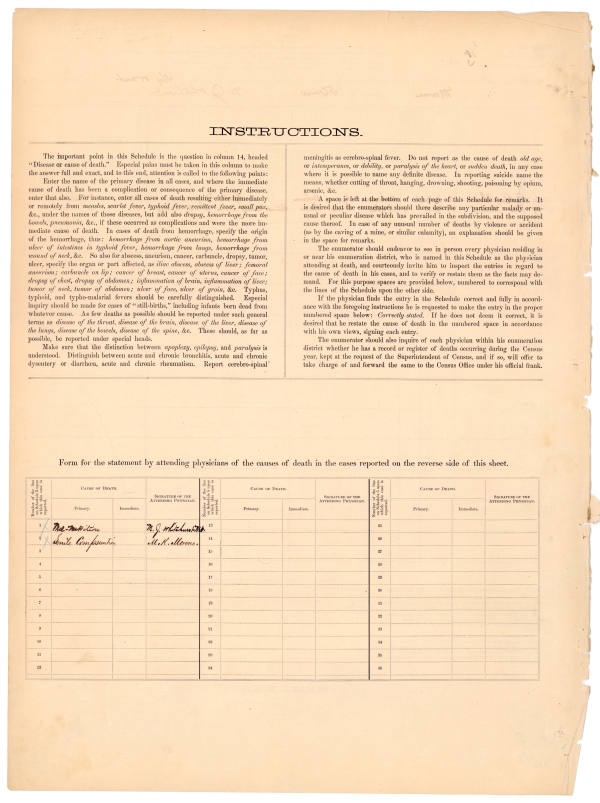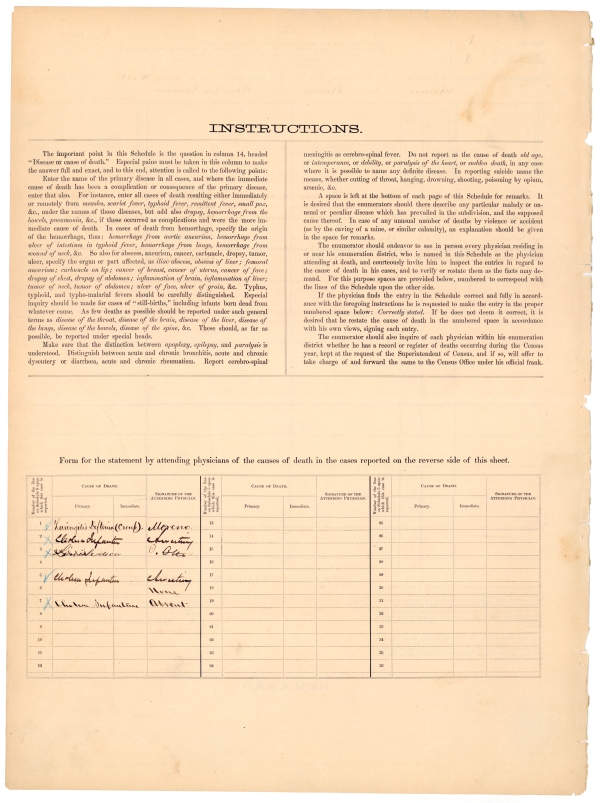Florida Memory is administered by the Florida Department of State, Division of Library and Information Services, Bureau of Archives and Records Management. The digitized records on Florida Memory come from the collections of the State Archives of Florida and the special collections of the State Library of Florida.

State Archives of Florida
- ArchivesFlorida.com
- State Archives Online Catalog
- ArchivesFlorida.com
- ArchivesFlorida.com
State Library of Florida
Related Sites

Description of previous item
Description of next item

Source
Description
Date
Contributors
Format
Personal Subjects
Albury, George, ca.1880-ca.1880
Alvares, Aldelida, ca.1880-ca.1880
Apizan, Eusebia, ca.1835-ca.1880
Archer, Benjamin, ca.1805-ca.1880
Arnold, Louis, ca.1875-ca.1880
Baker, Philip B., ca.1807-ca.1880
Barrios, Amelia, ca.1880-ca.1880
Beitue, Barbara, ca.1848-ca.1880
Cabuera, Timolia, ca.1867-ca.1880
Castillo, America, ca.1873-ca.1880
Castillo, Louriana, ca.1813-ca.1880
Castro, Marcelius, ca.1879-ca.1880
Chacon, Juan, ca.1831-ca.1880
Collins, James, ca.1880-ca.1880
Costa, Andres, ca.1863-ca.1880
Crapper, Charlotte, ca.1834-ca.1880
Cruz, Benjamin, ca.1820-ca.1880
Diaz, Allivo, ca.1880-ca.1880
Diaz, Juanna, ca.1879-ca.1880
Dominguez, Leopeldo, ca.1879-ca.1880
Duarte, Helena, ca.1876-ca.1880
Faola, Inez, ca.1879-ca.1880
Fontaine, Jane, ca.1818-ca.1880
Franklin, Thomas, ca.1834-ca.1880
Fripp, Anna L., ca.1872-ca.1880
Fulford, Heiram C., ca.1879-ca.1880
Garcia, Marclina, ca.1877-ca.1880
Gaudolpho, Celestino, ca.1877-ca.1880
Gerano, Francisco, ca.1854-ca.1880
Gomer, P., ca.1840-ca.1880
Gonzales, Petrona, ca.1805-ca.1880
Gonzalez, Ceveshina, ca.1880-ca.1880
Guitierres, Avalado, ca.1864-ca.1880
Heayos, Leopold, ca.1862-ca.1880
Hendry, Mary S., ca.1880-ca.1880
Herman, Ann, ca.1834-ca.1880
Hernandez, An, ca.1880-ca.1880
Hernandez, D., ca.1812-ca.1880
Hernandez, Joaquin, ca.1879-ca.1880
Hernandez, T., ca.1810-ca.1880
Jones, Bernard, ca.1869-ca.1880
Joutrera, Manual M., ca.1877-ca.1880
Kerr, Agnes, ca.1880-ca.1880
La Rosa, Merced, ca.1869-ca.1880
Labee, Mary, ca.1855-ca.1880
Lewis, Oscar, ca.1860-ca.1880
Lewry, Joseph, ca.1811-ca.1880
Llanes, Marcelino, ca.1841-ca.1880
Maloney, Miriam, ca.1880-ca.1880
Marshall, Emma, ca.1866-ca.1880
Morales, Artemis, ca.1835-ca.1880
Morris, Mary, ca.1880-ca.1880
Morton, Susan, ca.1847-ca.1880
Moss, Thomas, ca.1818-ca.1880
Mura, Regerio, ca.1880-ca.1880
Navarro, Damase, ca.1880-ca.1880
Ocha, Rosario, ca.1880-ca.1880
Ojecda, Dominga, ca.1864-ca.1880
Pent, Eugene, ca.1880-ca.1880
Pier, Dolores, ca.1799-ca.1880
Pinder, Frederick, ca.1814-ca.1880
Pinder, Harriet, ca.1880-ca.1880
Pinkney, Ellen, ca.1876-ca.1880
Pino, Manueal, ca.1792-ca.1880
Ranos, Sarah, ca.1878-ca.1880
Raphallo, Jose, ca.1880-ca.1880
Raphallo, Juan, ca.1877-ca.1880
Rio, Charles, ca.1878-ca.1880
Robert, Richard, ca.1873-ca.1880
Roberts, Jane, ca.1880-ca.1880
Roberts, Julia, ca.1848-ca.1880
Sebestian, Antonia, ca.1835-ca.1880
Sightbourne, James, ca.1868-ca.1880
Smith, Stephen, ca.1859-ca.1880
Thomas, Latitia, ca.1880-ca.1880
Trifth, Henry H., ca.1871-ca.1880
Valdes, Jacob, ca.1877-ca.1880
Valdez, Andre, ca.1876-ca.1880
Walkin, Jose, ca.1880-ca.1880
Walters, Cinde, ca.1880-ca.1880
Warren, Henry, ca.1880-ca.1880
Weeks, Alfred, ca.1874-ca.1880
Weeks, [Infant], ca.1880-ca.1880
Williams, Samual, ca.1879-ca.1880
Wilmington, D., ca.1879-ca.1880
Wilson, Sennard, ca.1880-ca.1880
Geographic Term
| Page | Line | Name | Age | Sex | Race | Cause of Death | Notes |
|---|---|---|---|---|---|---|---|
| 1 | 1 | Pinkney, Ellen | 4 years | Female | Black | Pneumonia An infection of the lungs characterized by inflammation and a buildup of fluid that makes it difficult to breathe (Hooper, Lexicon Medicum, 1860). | |
| 1 | 2 | Acosta, Adreas | 22 years | Male | Black | Fever | |
| 1 | 3 | Smith, Stephen | 21 years | Male | Black | Consumption Another name for tuberculosis, a bacterial infection of the lungs. | |
| 1 | 4 | Thomas, Latitia | 3 months | Female | Black | Inanition Exhaustion resulting from a lack of nourishment, primarily seen in infants (Dunglison, A Dictionary of Medical Science, 1893). | |
| 1 | 5 | Lewis, Oscar | 20 years | Male | Black | Consumption Another name for tuberculosis, a bacterial infection of the lungs. | |
| 1 | 8 | Ocha, Rosario | 7 months | Female | White | Tetanus infantum | |
| 1 | 9 | Mura, Regerio | 7 months | Male | White | Tetanus infantum | |
| 1 | 10 | Ojecda, Dominga | 16 years | Female | White | Puerperal convulsions | |
| 1 | 11 | Gonzales, Petrona | 75 years | Female | White | Dysentery A range of diseases causing inflammation of the large intestine. Symptoms included fever, severe diarrhea, and abdominal pain. Sometimes this was also called “flux.” The disease was thought to be endemic during the summer months (Dunglison, A Dictionary of Medical Science, 1893). | |
| 1 | 12 | Castillo, America | 7 years | Female | White | Croup A disease mainly attacking infants, in which the mucous membranes of the trachea become inflamed and cause the secretion of a thick mucus that makes it difficult to breathe. Also called cynanche trachealis (Hooper, Lexicon Medicum, 1860). | |
| 1 | 13 | Hernandez, T. | 70 years | Female | White | Cirrhosis of liver | |
| 1 | 14 | Pier, Dolores | 81 years | Female | White | Paralysis | |
| 1 | 15 | Morales, Artemis | 45 years | Female | White | Typhoid fever | |
| 1 | 16 | Gomer, P. | 40 years | Female | Black | Typhoid fever | |
| 1 | 17 | Chacon, Juan | 49 years | Male | White | Typhoid fever | |
| 1 | 18 | Labee, Mary | 25 years | Male | Black | Consumption Another name for tuberculosis, a bacterial infection of the lungs. | |
| 1 | 19 | Costa, Andres | 17 years | Male | Black | Consumption Another name for tuberculosis, a bacterial infection of the lungs. | |
| 1 | 20 | Cruz, Benjamin | 60 years | Male | White | Consumption Another name for tuberculosis, a bacterial infection of the lungs. | |
| 1 | 21 | Hernandez, D. | 68 years | Male | White | Consumption Another name for tuberculosis, a bacterial infection of the lungs. | |
| 1 | 22 | Heayos, Leopold | 18 years | Male | Black | Consumption Another name for tuberculosis, a bacterial infection of the lungs. | |
| 1 | 23 | Beitue, Barbara | 32 years | Female | White | Pneumonia An infection of the lungs characterized by inflammation and a buildup of fluid that makes it difficult to breathe (Hooper, Lexicon Medicum, 1860). | |
| 1 | 24 | Warren, Henry | 8 months | Male | White | Meningitis | |
| 1 | 25 | Robert, Richard | 7 years | Male | White | Paralysis | |
| 1 | 26 | Morton, Susan | 33 years | Female | White | Consumption Another name for tuberculosis, a bacterial infection of the lungs. | |
| 1 | 27 | Fontaine, Jane | 62 years | Female | White | Debility | |
| 1 | 28 | Moss, Thomas | 62 years | Male | Black | Epilepsy | |
| 1 | 29 | Roberts, Julia | 32 years | Female | White | Puerperal fever | |
| 1 | 30 | Walters, Cinde | 0 months | Male | White | Umbilical hemorrhage | |
| 2 | 1 | Crapper, Charlotte | 46 years | Female | Black | Dropsy A general term meaning the accumulation of fluid in some part of the body. A diagnosis of “dropsy” often meant the condition was prevalent throughout the body, while a case in which the accumulation of fluid was more localized might receive a more specific diagnosis. Examples include dropsy of the belly (ascites), the brain (hydrocephalus), the chest (hydrothorax), or the skin (anasarca) (Hooper, Lexicon Medicum, 1860). | |
| 2 | 2 | Castro, Marcelius | 1 year | Male | Black | Gastroenteritis | |
| 2 | 3 | Sebestian, Antonia | 45 years | Female | White | Typhoid fever | |
| 2 | 4 | Morris, Mary | 9 months | Female | Black | Tetanus infantum | |
| 2 | 5 | Arnold, Louis | 5 years | Male | White | Worms This could refer to any of a number of intestinal infections involving hookworms, roundworms, or similar parasites. | |
| 2 | 6 | Valdes, Jacob | 3 years | Male | Black | Typhoid fever | |
| 2 | 7 | Alvares, Aldelida | 1 month | Female | Black | Tetanus | |
| 2 | 8 | Llanes, Marcelino | 39 years | Male | White | Consumption Another name for tuberculosis, a bacterial infection of the lungs. | |
| 2 | 9 | Gaudolpho, Celestino | 3 years | Male | White | Diphtheria | |
| 2 | 10 | Guitierres, Avalado | 16 years | Male | Black | Cirrhosis of liver | |
| 2 | 11 | Raphallo, Juan | 3 years | Male | White | Brain fever | |
| 2 | 12 | Raphallo, Jose | 3 months | Male | White | Brain fever | |
| 2 | 13 | Hernandez, Joaquin | 1 year | Male | White | Dentition This refers to an infection caused by the eruption of new teeth in an infant. In the absence of modern fever reducers or antiseptic agents these infections could sometimes cause serious symptoms and even death (Dunglison, A Dictionary of Medical Science, 1893). | |
| 2 | 14 | Apizan, Eusebia | 45 years | Female | White | Typhoid | |
| 2 | 15 | Garcia, Marclina | 3 years | Female | White | Chlorosis anemia | |
| 2 | 16 | Dominguez, Leopeldo | 1 year | Male | White | Pneumonia An infection of the lungs characterized by inflammation and a buildup of fluid that makes it difficult to breathe (Hooper, Lexicon Medicum, 1860). | |
| 4 | 1 | Rio, Charles | 2 years | Male | Black | Marasmus A loss of weight and strength, and atrophying of the muscles due to a lack of nutrition or a dramatic loss of blood (Dunglison, A Dictionary of Medical Science, 1893). | |
| 4 | 2 | Pino, Manueal | 88 years | Male | White | Senile decay | |
| 6 | 1 | Sightbourne, James | 12 years | Male | Black | Lockjaw | |
| 6 | 2 | Herman, Ann | 46 years | Female | White | Abscess | |
| 6 | 3 | Gonzalez, Ceveshina | 1 month | Female | Black | Cholera infantum | |
| 6 | 4 | Maloney, Miriam | 1 month | Female | White | Lockjaw | |
| 6 | 5 | Castillo, Louriana | 67 years | Female | Black | Splenitis | |
| 6 | 6 | Franklin, Thomas | 46 years | Male | White | Cancer | |
| 6 | 7 | Gerano, Francisco | 26 years | Male | White | Consumption Another name for tuberculosis, a bacterial infection of the lungs. | |
| 6 | 8 | Faola, Inez | 1 year | Female | White | Cholera infantum | |
| 6 | 9 | Collins, James | 1 month | Male | White | Lockjaw | |
| 6 | 10 | Ranos, Sarah | 2 years | Female | White | Gastroenteritis | |
| 6 | 11 | Barrios, Amelia | 10 months | Female | White | Cholera infantum | |
| 6 | 12 | Marshall, Emma | 14 years | Female | White | Suicide | |
| 6 | 13 | Fulford, Heiram C. | 1 year | Male | White | Brain fever | |
| 6 | 14 | Hendry, Mary S. | 3 months | Female | White | Cholera infantum | |
| 6 | 15 | Wilmington, D. | 1 year | Male | Black | Diphtheria | |
| 6 | 16 | Navarro, Damase | 7 months | Male | White | Pernicious fever | |
| 6 | 17 | Cabuera, Timolia | 13 years | Male | White | Heart disease | |
| 6 | 18 | Walkin, Jose | 8 months | Male | White | Cold on the lungs | |
| 6 | 19 | Albury, George | 2 months | Male | White | Cholera infantum | |
| 6 | 20 | Kerr, Agnes | 9 months | Female | White | Abscess | |
| 6 | 21 | Diaz, Allivo | 6 months | Male | White | Cold | |
| 6 | 22 | Diaz, Juanna | 1 year | Female | White | Cold | |
| 6 | 23 | Archer, Benjamin | 75 years | Male | White | Ruitonitz [?] | |
| 6 | 24 | Jones, Bernard | 11 years | Male | White | Dentition This refers to an infection caused by the eruption of new teeth in an infant. In the absence of modern fever reducers or antiseptic agents these infections could sometimes cause serious symptoms and even death (Dunglison, A Dictionary of Medical Science, 1893). | |
| 6 | 25 | Williams, Samual | 1 year | Male | White | Croup A disease mainly attacking infants, in which the mucous membranes of the trachea become inflamed and cause the secretion of a thick mucus that makes it difficult to breathe. Also called cynanche trachealis (Hooper, Lexicon Medicum, 1860). | |
| 6 | 26 | Hernandez, An | 3 months | Male | White | Cholera infantum | |
| 6 | 27 | Duarte, Helena | 4 years | Female | White | Pulmonary phthisis | |
| 6 | 28 | Pent, Eugene | 5 months | Male | White | Teething Another name for dentition, the eruption of new teeth in an infant. This process sometimes caused an infection that triggered a fever. In the absence of modern fever reducers or antiseptic agents these infections could sometimes cause serious symptoms and even death (Dunglison, A Dictionary of Medical Science, 1893). | |
| 6 | 29 | Lewry, Joseph | 69 years | Male | White | Dropsy A general term meaning the accumulation of fluid in some part of the body. A diagnosis of “dropsy” often meant the condition was prevalent throughout the body, while a case in which the accumulation of fluid was more localized might receive a more specific diagnosis. Examples include dropsy of the belly (ascites), the brain (hydrocephalus), the chest (hydrothorax), or the skin (anasarca) (Hooper, Lexicon Medicum, 1860). | |
| 6 | 30 | Wilson, Sennard | 6 months | Male | White | Cholera infantum | |
| 6 | 31 | Valdez, Andre | 4 years | Male | Black | Croup A disease mainly attacking infants, in which the mucous membranes of the trachea become inflamed and cause the secretion of a thick mucus that makes it difficult to breathe. Also called cynanche trachealis (Hooper, Lexicon Medicum, 1860). | |
| 8 | 1 | La Rosa, Merced | 11 years | Female | White | Croup A disease mainly attacking infants, in which the mucous membranes of the trachea become inflamed and cause the secretion of a thick mucus that makes it difficult to breathe. Also called cynanche trachealis (Hooper, Lexicon Medicum, 1860). | |
| 8 | 2 | Pinder, Harriet | 5 months | Female | White | Cholera infantum | |
| 8 | 3 | Baker, Philip B. | 73 years | Male | White | Old age | |
| 8 | 4 | Fripp, Anna L. | 8 years | Female | White | Typhus fever | |
| 8 | 5 | Roberts, Jane | 8 months | Female | White | Cholera infantum | |
| 8 | 6 | Pinder, Frederick | 66 years | Male | White | Unknown | |
| 8 | 7 | Joutrera, Manual M. | 3 years | Male | White | Cholera infantum | |
| 10 | 1 | Trifth, Henry H. | 9 years | Male | White | Traumatic tetanus | |
| 12 | 1 | Weeks, Alfred | 6 years | Male | White | Fever | "The deaths reported above both occurred in the same family who live in the Ten Thousand Islands and could obtain neither medical attendance or medicine." |
| 12 | 2 | Weeks, [Infant] | 1 month | Female | White | Unknown | "The deaths reported above both occurred in the same family who live in the Ten Thousand Islands and could obtain neither medical attendance or medicine." |
Title
Subject
Description
Creator
Source
Date
Contributor
Format
Language
Type
Identifier
Coverage
Transcript
| Page | Line | Name | Age | Sex | Race | Cause of Death | Notes |
|---|---|---|---|---|---|---|---|
| 1 | 1 | Pinkney, Ellen | 4 years | Female | Black | Pneumonia | |
| 1 | 2 | Acosta, Adreas | 22 years | Male | Black | Fever | |
| 1 | 3 | Smith, Stephen | 21 years | Male | Black | Consumption | |
| 1 | 4 | Thomas, Latitia | 3 months | Female | Black | Inanition | |
| 1 | 5 | Lewis, Oscar | 20 years | Male | Black | Consumption | |
| 1 | 8 | Ocha, Rosario | 7 months | Female | White | Tetanus infantum | |
| 1 | 9 | Mura, Regerio | 7 months | Male | White | Tetanus infantum | |
| 1 | 10 | Ojecda, Dominga | 16 years | Female | White | Puerperal convulsions | |
| 1 | 11 | Gonzales, Petrona | 75 years | Female | White | Dysentery | |
| 1 | 12 | Castillo, America | 7 years | Female | White | Croup | |
| 1 | 13 | Hernandez, T. | 70 years | Female | White | Cirrhosis of liver | |
| 1 | 14 | Pier, Dolores | 81 years | Female | White | Paralysis | |
| 1 | 15 | Morales, Artemis | 45 years | Female | White | Typhoid fever | |
| 1 | 16 | Gomer, P. | 40 years | Female | Black | Typhoid fever | |
| 1 | 17 | Chacon, Juan | 49 years | Male | White | Typhoid fever | |
| 1 | 18 | Labee, Mary | 25 years | Male | Black | Consumption | |
| 1 | 19 | Costa, Andres | 17 years | Male | Black | Consumption | |
| 1 | 20 | Cruz, Benjamin | 60 years | Male | White | Consumption | |
| 1 | 21 | Hernandez, D. | 68 years | Male | White | Consumption | |
| 1 | 22 | Heayos, Leopold | 18 years | Male | Black | Consumption | |
| 1 | 23 | Beitue, Barbara | 32 years | Female | White | Pneumonia | |
| 1 | 24 | Warren, Henry | 8 months | Male | White | Meningitis | |
| 1 | 25 | Robert, Richard | 7 years | Male | White | Paralysis | |
| 1 | 26 | Morton, Susan | 33 years | Female | White | Consumption | |
| 1 | 27 | Fontaine, Jane | 62 years | Female | White | Debility | |
| 1 | 28 | Moss, Thomas | 62 years | Male | Black | Epilepsy | |
| 1 | 29 | Roberts, Julia | 32 years | Female | White | Puerperal fever | |
| 1 | 30 | Walters, Cinde | 0 months | Male | White | Umbilical hemorrhage | |
| 2 | 1 | Crapper, Charlotte | 46 years | Female | Black | Dropsy | |
| 2 | 2 | Castro, Marcelius | 1 year | Male | Black | Gastroenteritis | |
| 2 | 3 | Sebestian, Antonia | 45 years | Female | White | Typhoid fever | |
| 2 | 4 | Morris, Mary | 9 months | Female | Black | Tetanus infantum | |
| 2 | 5 | Arnold, Louis | 5 years | Male | White | Worms | |
| 2 | 6 | Valdes, Jacob | 3 years | Male | Black | Typhoid fever | |
| 2 | 7 | Alvares, Aldelida | 1 month | Female | Black | Tetanus | |
| 2 | 8 | Llanes, Marcelino | 39 years | Male | White | Consumption | |
| 2 | 9 | Gaudolpho, Celestino | 3 years | Male | White | Diphtheria | |
| 2 | 10 | Guitierres, Avalado | 16 years | Male | Black | Cirrhosis of liver | |
| 2 | 11 | Raphallo, Juan | 3 years | Male | White | Brain fever | |
| 2 | 12 | Raphallo, Jose | 3 months | Male | White | Brain fever | |
| 2 | 13 | Hernandez, Joaquin | 1 year | Male | White | Dentition | |
| 2 | 14 | Apizan, Eusebia | 45 years | Female | White | Typhoid | |
| 2 | 15 | Garcia, Marclina | 3 years | Female | White | Chlorosis anemia | |
| 2 | 16 | Dominguez, Leopeldo | 1 year | Male | White | Pneumonia | |
| 4 | 1 | Rio, Charles | 2 years | Male | Black | Marasmus | |
| 4 | 2 | Pino, Manueal | 88 years | Male | White | Senile decay | |
| 6 | 1 | Sightbourne, James | 12 years | Male | Black | Lockjaw | |
| 6 | 2 | Herman, Ann | 46 years | Female | White | Abscess | |
| 6 | 3 | Gonzalez, Ceveshina | 1 month | Female | Black | Cholera infantum | |
| 6 | 4 | Maloney, Miriam | 1 month | Female | White | Lockjaw | |
| 6 | 5 | Castillo, Louriana | 67 years | Female | Black | Splenitis | |
| 6 | 6 | Franklin, Thomas | 46 years | Male | White | Cancer | |
| 6 | 7 | Gerano, Francisco | 26 years | Male | White | Consumption | |
| 6 | 8 | Faola, Inez | 1 year | Female | White | Cholera infantum | |
| 6 | 9 | Collins, James | 1 month | Male | White | Lockjaw | |
| 6 | 10 | Ranos, Sarah | 2 years | Female | White | Gastroenteritis | |
| 6 | 11 | Barrios, Amelia | 10 months | Female | White | Cholera infantum | |
| 6 | 12 | Marshall, Emma | 14 years | Female | White | Suicide | |
| 6 | 13 | Fulford, Heiram C. | 1 year | Male | White | Brain fever | |
| 6 | 14 | Hendry, Mary S. | 3 months | Female | White | Cholera infantum | |
| 6 | 15 | Wilmington, D. | 1 year | Male | Black | Diphtheria | |
| 6 | 16 | Navarro, Damase | 7 months | Male | White | Pernicious fever | |
| 6 | 17 | Cabuera, Timolia | 13 years | Male | White | Heart disease | |
| 6 | 18 | Walkin, Jose | 8 months | Male | White | Cold on the lungs | |
| 6 | 19 | Albury, George | 2 months | Male | White | Cholera infantum | |
| 6 | 20 | Kerr, Agnes | 9 months | Female | White | Abscess | |
| 6 | 21 | Diaz, Allivo | 6 months | Male | White | Cold | |
| 6 | 22 | Diaz, Juanna | 1 year | Female | White | Cold | |
| 6 | 23 | Archer, Benjamin | 75 years | Male | White | Ruitonitz [?] | |
| 6 | 24 | Jones, Bernard | 11 years | Male | White | Dentition | |
| 6 | 25 | Williams, Samual | 1 year | Male | White | Croup | |
| 6 | 26 | Hernandez, An | 3 months | Male | White | Cholera infantum | |
| 6 | 27 | Duarte, Helena | 4 years | Female | White | Pulmonary phthisis | |
| 6 | 28 | Pent, Eugene | 5 months | Male | White | Teething | |
| 6 | 29 | Lewry, Joseph | 69 years | Male | White | Dropsy | |
| 6 | 30 | Wilson, Sennard | 6 months | Male | White | Cholera infantum | |
| 6 | 31 | Valdez, Andre | 4 years | Male | Black | Croup | |
| 8 | 1 | La Rosa, Merced | 11 years | Female | White | Croup | |
| 8 | 2 | Pinder, Harriet | 5 months | Female | White | Cholera infantum | |
| 8 | 3 | Baker, Philip B. | 73 years | Male | White | Old age | |
| 8 | 4 | Fripp, Anna L. | 8 years | Female | White | Typhus fever | |
| 8 | 5 | Roberts, Jane | 8 months | Female | White | Cholera infantum | |
| 8 | 6 | Pinder, Frederick | 66 years | Male | White | Unknown | |
| 8 | 7 | Joutrera, Manual M. | 3 years | Male | White | Cholera infantum | |
| 10 | 1 | Trifth, Henry H. | 9 years | Male | White | Traumatic tetanus | |
| 12 | 1 | Weeks, Alfred | 6 years | Male | White | Fever | "The deaths reported above both occurred in the same family who live in the Ten Thousand Islands and could obtain neither medical attendance or medicine." |
| 12 | 2 | Weeks, [Infant] | 1 month | Female | White | Unknown | "The deaths reported above both occurred in the same family who live in the Ten Thousand Islands and could obtain neither medical attendance or medicine." |
Collection ID
Subject - Person
ImageID
Thumbnail
Geographic Term
Chicago Manual of Style
United States. Department of the Interior. Monroe County Mortality Schedule for the Federal Census of 1880. 1880. State Archives of Florida, Florida Memory. <https://www.floridamemory.com/items/show/345772>, accessed 19 February 2026.
MLA
United States. Department of the Interior. Monroe County Mortality Schedule for the Federal Census of 1880. 1880. State Archives of Florida, Florida Memory. Accessed 19 Feb. 2026.<https://www.floridamemory.com/items/show/345772>
AP Style Photo Citation
(State Archives of Florida/United States. Department of the Interior.)

 Listen: The World Program
Listen: The World Program









